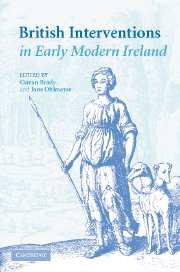Book contents
- Frontmatter
- Contents
- Notes on contributors
- Acknowledgements
- Aidan Clarke: an appreciation
- Conventions
- List of abbreviations
- 1 Making good: New perspectives on the English in early modern Ireland
- 2 The attainder of Shane O'Neill, Sir Henry Sidney and the problems of Tudor state-building in Ireland
- 3 Dynamics of regional development: processes of assimilation and division in the marchland of south-east Ulster in late medieval and early modern Ireland
- 4 The ‘common good’ and the university in an age of confessional conflict
- 5 The construction of argument: Henry Fitzsimon, John Rider and religious controversy in Dublin, 1599–1614
- 6 The Bible and the bawn: an Ulster planter inventorised
- 7 ‘That Bugbear Arminianism’: Archbishop Laud and Trinity College, Dublin
- 8 The Irish peers, political power and parliament, 1640–1641
- 9 The Irish elections of 1640–1641
- 10 Catholic Confederates and the constitutional relationship between Ireland and England, 1641–1649
- 11 Protestant churchmen and the Confederate Wars
- 12 The crisis of the Spanish and the Stuart monarchies in the mid-seventeenth century: local problems or global problems?
- 13 Settlement, transplantation and expulsion: a comparative study of the placement of peoples
- 14 Interests in Ireland: the ‘fanatic zeal and irregular ambition’ of Richard Lawrence
- 15 Temple's fate: reading The Irish Rebellion in late seventeenth-century Ireland
- 16 Conquest versus consent as the basis of the English title to Ireland in William Molyneux's Case of Ireland … Stated (1698)
- Principal publications of Aidan Clarke
- Index
11 - Protestant churchmen and the Confederate Wars
Published online by Cambridge University Press: 31 July 2009
- Frontmatter
- Contents
- Notes on contributors
- Acknowledgements
- Aidan Clarke: an appreciation
- Conventions
- List of abbreviations
- 1 Making good: New perspectives on the English in early modern Ireland
- 2 The attainder of Shane O'Neill, Sir Henry Sidney and the problems of Tudor state-building in Ireland
- 3 Dynamics of regional development: processes of assimilation and division in the marchland of south-east Ulster in late medieval and early modern Ireland
- 4 The ‘common good’ and the university in an age of confessional conflict
- 5 The construction of argument: Henry Fitzsimon, John Rider and religious controversy in Dublin, 1599–1614
- 6 The Bible and the bawn: an Ulster planter inventorised
- 7 ‘That Bugbear Arminianism’: Archbishop Laud and Trinity College, Dublin
- 8 The Irish peers, political power and parliament, 1640–1641
- 9 The Irish elections of 1640–1641
- 10 Catholic Confederates and the constitutional relationship between Ireland and England, 1641–1649
- 11 Protestant churchmen and the Confederate Wars
- 12 The crisis of the Spanish and the Stuart monarchies in the mid-seventeenth century: local problems or global problems?
- 13 Settlement, transplantation and expulsion: a comparative study of the placement of peoples
- 14 Interests in Ireland: the ‘fanatic zeal and irregular ambition’ of Richard Lawrence
- 15 Temple's fate: reading The Irish Rebellion in late seventeenth-century Ireland
- 16 Conquest versus consent as the basis of the English title to Ireland in William Molyneux's Case of Ireland … Stated (1698)
- Principal publications of Aidan Clarke
- Index
Summary
In August 1646 eleven bishops of the Church of Ireland put their signatures to a remonstrance delivered to the lord lieutenant, James Butler, marquis of Ormond. Their present purpose was to record their approval of the ‘most necessary peace’ recently concluded between Ormond and the Confederate Catholics, ‘the only meanes to continue the great blessings of Religion and Loyaltye amonge us: And to be the only hopefull way to reduce this Kingdome wholly to his Ma[jes]tys obedience’. But they also articulated their gratitude to the lord lieutenant for preserving, in Dublin and its out garrisons, ‘free and full exercise of the trewe reformed Religion accordinge to the Liturgie and Canons soe many years received in the Church … Which with sadd and bleedinge Harts we may say is more than we knowe to be in any part of the three Dominions.’ The Irish capital had become, however briefly, not merely an isolated religious outpost in Ireland, but the last bastion of a form of church order and worship within the Stuart realms.
The 1640s are the lost decade in the history of the Protestant church establishment in early modern Ireland, and not without good reason. Scholarly work over the last thirty years has transformed our understanding of the Church of Ireland in the years before the watershed event of the 1641 rising, as well as the fate of the Protestant establishment in the 1650s and beyond.
- Type
- Chapter
- Information
- British Interventions in Early Modern Ireland , pp. 230 - 251Publisher: Cambridge University PressPrint publication year: 2005



